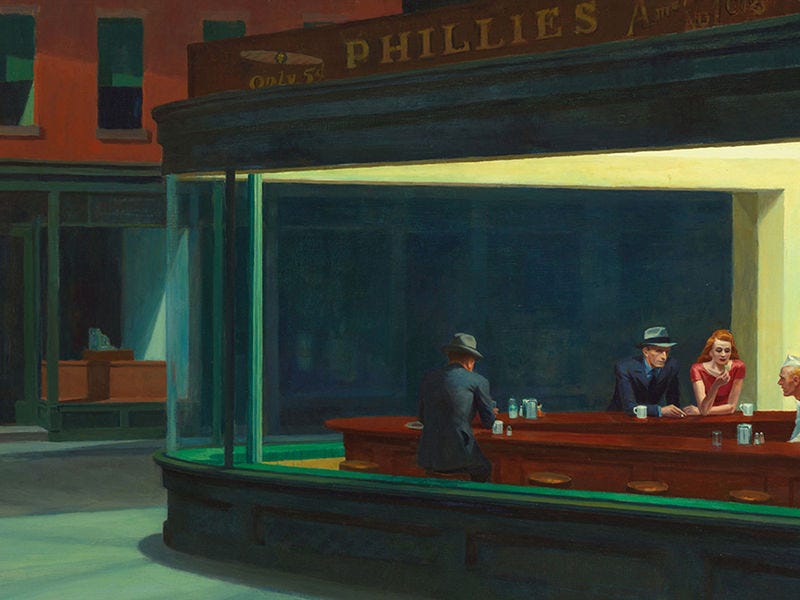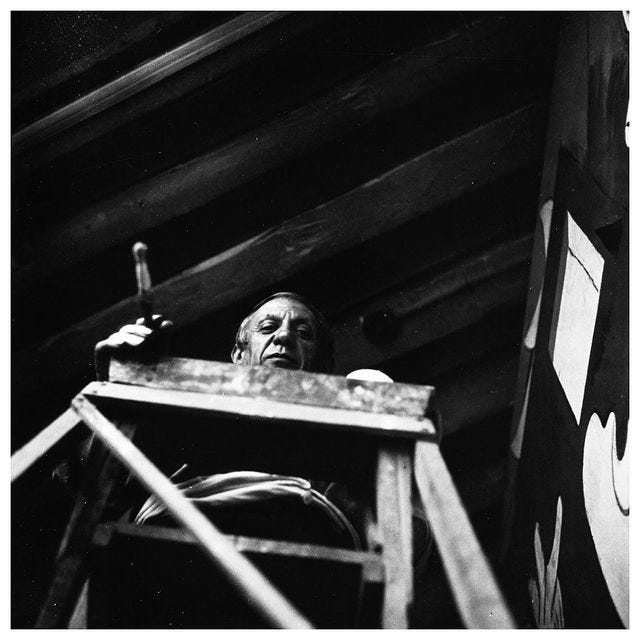Tiny Revolutions №21: The Lonely City
+++lean in+++
Hi, I’m Sara, and this is Tiny Revolutions, a newsletter with personal writing and links about about the practice of staying mentally healthy. I’d love to hear from you, so reply anytime and let me know what you think!

It’s been a few weeks since I returned from Minnesota to LA, and therefore from living with people to living alone again.
I was ready to come home. Not because I was unhappy being at my sister’s house, but because I missed my life. I missed my apartment and my things and my friends and my city. My place, psychically.
I always think of myself as having a mutable personality. I’ve probably just read too many astrology columns (hi, I’m a Virgo), but I’m usually more attuned to accommodating others and ensuring harmony in whatever group dynamic I’m part of than in setting my own agenda. It’s one of the reasons I live alone—because while I thrive off connections with other people, I know somewhere deep in my gut that if I’m always with them, I’ll just go with the flow at the expense of my own needs and desires.
I feel more like myself when I am alone than at any other time. It’s the only time I can be sure I’m not performing for someone else. I need the solitude to remember what matters to me, because without it, I get caught in someone else’s current like a leaf on the wind. But that doesn’t mean I’m not lonely. I’m lonely a lot, and especially right now. I miss coffee shops and coworking spaces and dating and dinners with friends. The comforts of other creatures, and even the sorrows.
I’ve been reading Olivia Laing’s excellent book, The Lonely City, and it’s really striking a chord. I love the book’s premise, which is that despite the stigma attached to it, loneliness is a highly populated place (we're in the midst of a well-documented loneliness epidemic) that’s well worth exploring. In her words, loneliness “cuts right to the heart of what we value and what we need.”

In her essay about Edward Hopper, painter of the loneliness classic Nighthawks, Laing identifies loneliness as a private burden, yet a communal condition, putting a fine point on its inherent paradox and citing the sad reality of how in the presence of someone else’s extreme loneliness, our empathy is often extinguished. We react as though loneliness is contagious and are repulsed, which only makes the sufferer’s loneliness more entrenched.
I’ve found this in my own writing—both my unwillingness to write about being lonely and, when I have written something, my reluctance to share it. I have been afraid that admitting to being lonely will make me seem desperate and alienate others; what’s appealing about a lonely person? There’s a social dynamic and assumption at work that if a person spends a lot of time alone it must be because something is wrong with them. Which is bullshit, because loneliness is something we all understand—just part of the human condition. Otherwise why would Edward Hopper be one of the most famous artists of the 20th century?
As Laing’s book shows, even Hopper himself, the master of lonely city scenes, never admitted to being lonely.
But what if we treat loneliness as something we can work with? Can we acknowledge that you can be lonely but not desperate, not an object to be pitied, sometimes even content in your solitude? Can we all just lean into loneliness and see what comes out of it?
To be clear, I’m not advocating for isolating oneself—not ever, and especially not now. I know the routines I have for connection, both online and off, are the only thing keeping me sane. But I’m wondering if we can stop fighting it and treating it as something to be avoided at all costs. To bring the condition of loneliness into the norm. To be vulnerable, to be open. We’re all here. It’s ok.
Here are some things I found interesting this week:
“There is a sense that this quarantine will further cement my singleness. Social distancing makes forming meaningful connections feel almost impossible.”
Oh, I feel you there, sister. Here’s an excellent feature from The New York Times with portraits and testimonials from people who are riding out the quarantine alone.
Speaking of loneliness classics, here’s a song about leaning the fuck into loneliness. Thom Yorke knows.
Pablo knew.
Dilruba Ahmed, who I’d never heard of until I came across this poem, knows.

Are you lonely? Can it be OK?
😘
Sara
p.s. Thanks for reading. Tell a friend about this newsletter! Or share it somewhere. Let’s think about this shit together.



